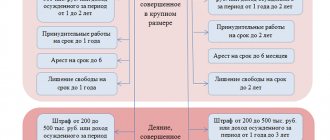Payment terms under loan agreements
The Central Bank, in its letter dated March 27, 2021 No. IN-03-31/32, indicated that if the last day of the loan payment period falls on a non-working day, then the last date is considered such a non-working day (except Saturday and Sunday).
However, the Supreme Court pointed out that the Central Bank does not have such powers and its letters cannot be above the law. Failure to pay the payments stipulated by the contract during the period from March 30 to April 3, 2021 is not a delay in the fulfillment of obligations, and the postponement of the deadline for fulfilling an obligation to the next next business day cannot be considered as a violation of the deadlines for fulfilling obligations.
Penalty and writs of execution during the moratorium period
One of the consequences of the introduction of a moratorium is the cessation of accrual of penalties (fines and penalties) and other financial sanctions for non-fulfillment or improper fulfillment by the debtor of monetary obligations and mandatory payments for claims that arose before the introduction of the moratorium.
In addition, the introduction of a moratorium against the debtor also means that it is impossible for the creditor to obtain compulsory execution by presenting the writ of execution directly to the bank. However, it is worth considering that the moratorium applies only to the most affected sectors of the economy
8-921-903-17-16
| A fine of five times the cost of goods for each month and other changes to the law “On the Protection of Consumer Rights” |
When the goods do not arrive within the time specified in the contract, the customs authorities and the bank’s currency control will definitely remind you of this, and the former will also send a summons to give explanations and draw up an administrative protocol under clause 5 of Art. 15.25 Code of Administrative Offenses of the Russian Federation.
However, not every decision reaches the court. In this situation, the presence of a lawyer when giving explanations can not only affect the reclassification of the article, but also postpone the preparation of the administrative protocol for a long time.
Documents for currency control and deadlines for their submission
The larger the transaction amount, the stricter the bank’s control:
| Type of transaction | Transaction amount, thousand rubles. | |||
| up to 200 | 200 — 3 000 | 3 000 — 6 000 | > 6 000 | |
| What documents are required by currency control? | ||||
| Export | No documents needed. We only inform the bank of the transaction code* | Invoice, contract, acceptance certificate or other document so that the bank can determine the transaction code | Invoice, contract, acceptance certificate or other document so that the bank can determine the transaction code | The contract to be registered |
| Import (credit) | The contract to be registered | |||
*The transaction code can be found in the list (Appendix No. 1 to the Central Bank Instruction No. 181-I dated August 16, 2017).
As can be seen from the table, in case of serious transaction amounts, the resident needs to present a contract with a foreign partner to the bank. The bank will register the document and assign it a number. If there is no ready-made contract yet, you can submit a draft of it to the bank. The main thing is that the project is signed by the counterparty. The deadline for submitting the draft contract is no more than 15 days from the date of signing .
For all contracts that have been registered, a special form must be drawn up - a certificate of supporting documents (SPD). It is a list of documentation related to the execution of the contract.
The SPD is submitted within the prescribed period - no later than 15 days after the end of the month in which the transaction took place.
In particular:
- when shipping goods for export or when importing imports, the month of the transaction is the month in which the customs declaration was completed;
- when providing services - the month in which the acceptance certificate was signed.
Ak Bars Bank provides a full range of services for cash settlements in foreign currency for legal entities and individual entrepreneurs. We offer:
- free opening of foreign currency accounts when connecting to the package;
- receiving details immediately for accounts in dollars and euros;
- free consultations on foreign exchange transactions.
Open an account in dollars and euros online
What is the fine for violating clause 5 of Art. 15.25?
The amount of the fine depends on the situation at the time of drawing up the protocol, namely: if the funds or part of them are returned, then a fine in the amount of 1/150 of the refinancing rate of the Central Bank of the Russian Federation for each day of delay. For the remaining amount (as well as if nothing was returned at all), a fine of ¾ or one whole of the unreturned amount is imposed. In simple words, if $1,000,000 is not returned, then the fine will be either $750,000 or $1,000,000.
- All
- Fine in foreign currency
Will the fine be imposed not only on the company, but also on the manager?
Not really. A note to Article 15.25 of the Code of Administrative Offenses states that the administrative liability established for officials in parts 1, 4 and 5 applies only to persons engaged in business activities without forming a legal entity (i.e. individual entrepreneurs)
The fine amount is obtained in foreign currency. At what rate is the conversion carried out?
Conversion of foreign currency, as well as the value of domestic and foreign securities into the currency of the Russian Federation, is carried out at the exchange rate of the Central Bank of the Russian Federation in effect on the day the administrative offense was committed or detected.
What transactions are subject to currency control?
Subject to control:
- All payment transactions between residents and non-residents.
Important: the payment currency does not matter. Even if the foreign counterparty made payment under the contract in rubles, the transaction is subject to control.
- All movements of securities and money across the border of the Russian Federation.
- All payments between non-residents are in rubles.
- All payments between residents are in foreign currency.
In general, payments in foreign currency between residents are prohibited. But there are a number of exceptions. For example, when a Russian organization pays employees an advance in foreign currency to cover travel expenses on trips abroad.
Settlements between residents and non-residents are in principle unlimited. But the procedure for processing transactions is strictly regulated. It is necessary to comply with the terms of payments under the contract and submit correctly executed documents to the bank on time.
They sent a summons for questioning to the customs authority. Is it worth going?
Definitely worth it. The point is that the case cannot be abandoned, but the fact is that if the decision of the customs authority is challenged, the judge will first of all pay attention to your actions at the stage of administrative proceedings.
The fact is that some people mistakenly believe that if they don’t come for interrogation and sign the protocol, they won’t get anything for it. This is wrong. The inspector can sign the protocol unilaterally and will not in any way affect the further course of the case. But in court this will have negative consequences, since judges interpret refusal to sign the protocol as an attempt to evade responsibility and there will be no need to wait for leniency.
And vice versa, if the judge sees that you were present both during the preparation of the protocol and at the meeting of the administrative commission of the customs authority, then in his decision, the judge may reduce the fine to less than the minimum (the Supreme Court allowed the imposition of fines less than the minimum in administrative cases), or cancel it completely due to the insignificance of the public offense. But again, this can only happen if you are active.
What is the fine for violating clause 5 of Art. 15.25?
The amount of the fine depends on the situation at the time of drawing up the protocol, namely: if the funds or part of them are returned, then a fine in the amount of 1/150 of the refinancing rate of the Central Bank of the Russian Federation for each day of delay. For the remaining amount (as well as if nothing was returned at all), a fine of ¾ or one whole of the unreturned amount is imposed. In simple words, if $1,000,000 is not returned, then the fine will be either $750,000 or $1,000,000.
- All
- Fine in foreign currency
Will the fine be imposed not only on the company, but also on the manager?
Not really. A note to Article 15.25 of the Code of Administrative Offenses states that the administrative liability established for officials in parts 1, 4 and 5 applies only to persons engaged in business activities without forming a legal entity (i.e. individual entrepreneurs)
The fine amount is obtained in foreign currency. At what rate is the conversion carried out?
Conversion of foreign currency, as well as the value of domestic and foreign securities into the currency of the Russian Federation, is carried out at the exchange rate of the Central Bank of the Russian Federation in effect on the day the administrative offense was committed or detected.
Penalties in 2021
Due to changes in the Code of Administrative Offenses that came into force this year, fines for which administrative liability is provided have also increased. All of them are listed in Article 15.25 of the Administrative Code. Since from now on all legal entities registered on the territory of the Russian Federation are considered its residents, monetary sanctions for them have also increased.
To avoid fines, you must submit to the tax authorities on time:
- report on the movement of currency funds in accounts;
- notifications about the opening or, conversely, closing of foreign accounts, as well as changes in their details;
- documents confirming the legality of transactions.
Important! From 2021, transaction passports have been cancelled. Now there is no need to formalize them and, accordingly, submit them to regulatory authorities. Instead, the bank will independently register agreements and contracts if their amount exceeds 3 million rubles.
Amounts of fines in 2021:
- For carrying out a currency transaction that is not permitted by law, the fine will range from ¾ to the entire transaction amount (for example, if you were supposed to send 100,000 rubles abroad, then the fine may be from 75,000 to 100,000 rubles).
- Violation of the deadlines for receipt of funds specified in the contract. If the amount was transferred late, the fine will be 1/150 of the Central Bank key rate (from July 26, 2021 it is equal to 7.25%) of the contract amount, and if the money did not arrive at all - from ¾ to the entire transaction amount.
- Violation of deadlines for transactions involving registration of an agreement - from 40 to 50 thousand rubles.
- Violations of deadlines for the return of advance funds received as an advance payment for goods if delivery never took place. If the amount was transferred late, the fine will be 1/150 of the Central Bank key rate of the contract amount, and if the money did not arrive at all - from ¾ to the entire transaction amount.
- Violation of the deadlines for submitting notifications about opening a foreign currency account (closing, changing details) - for individuals the fine will be from 1 to 1.5 thousand rubles, for legal entities - from 50 to 100 thousand.
- Failure to provide information on a foreign currency account for individuals will result in sanctions in the amount of 4-5 thousand rubles, for legal entities - from 80 thousand to 1 million rubles.
- Violation of deadlines for submitting reporting documentation on the movement of foreign currency in accounts (including foreign ones) - for individuals the fine will be from 300 to 3 thousand rubles, for legal entities - from 5 to 50 thousand rubles (depending on the number of overdue days).
- Repeated violations associated with violation of deadlines for submitting documents entail increased penalties - for individuals the maximum amount of penalties will be 20 thousand rubles, for legal entities - 600 thousand.
They sent a summons for questioning to the customs authority. Is it worth going?
Definitely worth it. The point is that the case cannot be abandoned, but the fact is that if the decision of the customs authority is challenged, the judge will first of all pay attention to your actions at the stage of administrative proceedings.
The fact is that some people mistakenly believe that if they don’t come for interrogation and sign the protocol, they won’t get anything for it. This is wrong. The inspector can sign the protocol unilaterally and will not in any way affect the further course of the case. But in court this will have negative consequences, since judges interpret refusal to sign the protocol as an attempt to evade responsibility and there will be no need to wait for leniency.
And vice versa, if the judge sees that you were present both during the preparation of the protocol and at the meeting of the administrative commission of the customs authority, then in his decision, the judge may reduce the fine to less than the minimum (the Supreme Court allowed the imposition of fines less than the minimum in administrative cases), or cancel it completely due to the insignificance of the public offense. But again, this can only happen if you are active.
How to get a fine canceled or postpone the drawing up of an administrative protocol?
In each case, such methods are individual and depend on the contract and its amount. But there are general actions and ways to minimize the consequences of violating currency laws.
According to the legal position of the Presidium of the Supreme Arbitration Court of the Russian Federation, formulated in Resolution No. 5227/09 dated September 15, 2009, it follows that:
A systematic analysis of these legal norms allows us to conclude that the resident’s failure to fulfill the obligation to return funds paid to non-residents for goods not imported into the customs territory of the Russian Federation (not received in the customs territory of the Russian Federation) in the absence of facts of illegal behavior of the resident preventing the receipt of goods or return of paid funds, as well as in the event that a resident takes measures depending on him to receive these funds does not constitute an offense established by part 5 of Article 15.25 of the Code of Administrative Offenses of the Russian Federation.
Resolution of the Presidium of the Supreme Arbitration Court of the Russian Federation dated September 15, 2009 N 5227/09
In addition, the courts of first and appellate instances (in the above case) established that the company took measures to return the money paid for the goods, namely: it contacted a Chilean law firm about their return on the day when it learned that the seller had transferred the goods to another person, entered into an agreement with a Russian law firm for legal assistance regarding the issue of debt repayment by the seller, and sent an official claim to the seller.
In other cases, the contract is extended or changes are made.
Current issues of currency regulation
04/25/2017 # Industry research - publications Oil and gas industry | "KAMERTON-AK" Pharmaceuticals - industries
Current issues of currency regulation
Companies participating in foreign trade activities are often held accountable for violations of currency legislation. Disputes about bringing to administrative liability under Art. 15.25 of the Code of Administrative Offenses of the Russian Federation often end up in court, since the statute of limitations for this article is 2 years (clause 1 of Article 4.5 of the Code of Administrative Offenses of the Russian Federation). In this material we will consider the most pressing issues of currency regulation through the prism of judicial practice.
Currency control documents accompanying a foreign economic transaction
Such documents include a transaction passport, a certificate of currency transactions and a certificate of supporting documents, as well as the documents themselves on currency transactions (acts, invoices, invoices, etc.).
The timing for completing these documents depends on the specific situation. For example, if goods are exported to a country outside the Eurasian Economic Community on the terms of subsequent payment, then the transaction passport is submitted to the bank no later than the day the goods declaration is submitted (clause 6.5.4 of Bank of Russia Instruction No. 138-I dated June 4, 2012 - further Instruction No. 138-I). When receiving currency, a certificate of foreign exchange transactions is submitted no later than 15 days, and when writing off currency from an account - on the day of such write-off (clause 2.3 of Instruction No. 138-I). For violations when submitting or processing these documents, administrative liability is provided under paragraphs. 6 – 6.4 tbsp. 15.25 of the Code of Administrative Offenses of the Russian Federation in the amount of up to 150 thousand rubles.
The transaction passport is one of the main foreign trade documents; it is issued for all types of foreign economic transactions if the amount of obligations under the contract is equal to or exceeds the equivalent of $50,000 (clause 5.2 of Instruction 138-I). If the transaction passport is executed incorrectly, or the deadlines for its preparation or re-registration are violated, the company may be fined in the amount of 40 thousand to 50 thousand rubles (Clause 6 of Article 15.25 of the Code of Administrative Offenses of the Russian Federation).
An example of such a dispute is a case that reached the Supreme Court of the Russian Federation (Determination No. 304-AD16-11123 of October 31, 2016). The company, having concluded an additional agreement to the contract, had to submit to the authorized bank an application for re-issuance of the transaction passport and the additional agreement to the contract itself within the period established by Instruction No. 138-I, but allowed a delay of 20 days. In connection with the above, all courts recognized the legality of imposing a fine in the amount of 40 thousand rubles, rejecting the company’s position that this violation could be considered minor (Article 2.9 of the Code of Administrative Offenses of the Russian Federation).
Failure to timely submit other currency control documents also entails administrative liability, which can rarely be challenged. For example, the court supported the imposition of a fine under clause 6.3 of Art. 15.25 of the Administrative Code in connection with the untimely submission of a certificate of supporting documents when importing goods into the Russian Federation (Resolution of the Supreme Court of the Russian Federation of April 13, 2015 No. 308-AD14-8668).
The chances for companies when penalties are imposed on them on the grounds under consideration are left to challenge the fine on the basis of procedural errors by regulatory authorities. Indicative in this regard is the Supreme Court Resolution No. 310-AD15-4350 of May 19, 2015. The company protested against bringing it to administrative responsibility for untimely submission of currency control documents, lost the case in the court of first instance, but the appeal satisfied the demands of the company, and the highest authority upheld the decision of the appeal court, citing the following. The fine was imposed for late submission of a certificate of currency transaction; the control body qualified the violation under clause 6.2 of Art. 15.25 of the Code of Administrative Offenses of the Russian Federation, but incorrectly calculated the deadline for fulfilling the obligation to submit documents. The appellate court indicated that the deadline for submitting currency control documents is calculated in working days, not calendar days (clauses 2.3 and 3.8 of Instruction No. 138-I), therefore the company was subject to liability not under clause 6.2, but under clause 6.1 Art. 15.25 Code of Administrative Offenses of the Russian Federation. Thus, the decision to impose administrative liability was overturned by the court, and the company avoided a fine, despite the fact of the violation. In a similar situation, the Federal Passenger Company won the dispute and canceled the fine (Resolution 9 of the AAS dated November 18, 2016 in case No. A40-71687/16).
Repatriation of foreign exchange earnings
Article 19 of the Federal Law “On Currency Regulation and Currency Control” establishes the obligation for residents to ensure the return to the Russian Federation of funds paid under contracts to foreign counterparties if they do not fulfill their obligations in a timely manner. This applies to both payment for exported goods, work performed for non-residents, services provided, rent, payment for intellectual property, as well as advances transferred to non-residents, loans provided to foreigners, and commercial loans.
If a foreign trade participant does not comply with the requirements for the return of such payments, he may face a large fine under clause 4 of Art. 15.25 of the Code of Administrative Offenses of the Russian Federation in proportion to the amount “settled” abroad or untimely returned. Thus, the Russian company was fined more than 1 million rubles. (which amounted to almost 50% of the contract price) for failing to ensure the return by the foreign counterparty of the advance received from the Russian company for services not provided before the expiration of the contract. And the court recognized the legality of imposing a fine, despite the fact that the parties agreed to extend the contract and the services were actually provided by the foreign counterparty, albeit beyond the originally established contract period (Resolution of the Supreme Court of the Russian Federation dated January 19, 2015 in case No. 304-AD14- 5108).
In another case, the company was fined almost 2 million rubles. (75% of the contract price) for the fact that a non-resident did not pay for the services of a Russian company on time. The company challenged the fine due to the expiration of the statute of limitations, because 3 years had elapsed from the date of payment under the terms of the contract at the time the fine was imposed. The AS of the West Siberian District, in its Resolution dated June 16, 2016 in case A27-24826/2015, confirmed the opinion of the supervisory authority, and the Supreme Court refused to satisfy the company’s complaint. The courts referred to the fact that the agreement concluded by the parties to extend the contract and the payment period did not change the settlement procedure and the moment the obligation to pay for services arose. And the statute of limitations for bringing to responsibility must be counted from the date of completion of the contract, taking into account its extension.
It should be taken into account that non-monetary forms of settlements with non-residents can be subject to serious sanctions. Thus, Resolution of the Supreme Court of the Russian Federation No. 301-AD16-8259 dated June 24, 2016 put an end to the society’s struggle for the abolition of a fine in the amount of 22 million rubles due to non-receipt of payment for exported goods. The company exported goods, but instead of cash payment, it agreed with the foreign buyer to repay the debt with a counter supply of goods. The Supreme Court upheld the fine, pointing out that an exhaustive list of situations when currency under a contract may not be credited to a bank account is given in paragraph 2 of Art. 19 of the Federal Law “On Currency Regulation and Currency Control”. The specified list does not include such a basis for non-receipt of cash proceeds as the fulfillment by a non-resident of obligations to pay by counter-delivery of goods. Even the fact that the cost of goods received from a foreign counterparty in payment for the delivery of goods exceeded the amount of lost revenue by almost 10 times did not help the company in this situation. The court found that the fact that the company sold the goods received from a non-resident without importing them into the Russian Federation, having received ruble bills of exchange as payment for the goods, indicates that the company’s actions were aimed at evading the obligation to repatriate foreign currency earnings to the Russian Federation.
The bill of exchange system of payment in foreign trade transactions itself, although not directly prohibited, in practice threatens close attention from regulatory authorities. The Federal Tax Service of the Russian Federation in Letter dated December 24, 2015 No. ED-4-2/ [email protected] explained that the fact that a resident received a bill of exchange from a foreign buyer in payment for exported goods cannot be equated to the repatriation of foreign currency earnings.
Currency legislation does not contain a direct prohibition on the offset of mutual claims under agreements between residents and non-residents, but such an offset goes against the rules regarding the repatriation of foreign currency earnings, i.e. is unlawful (Resolution of the Moscow District Court dated 04/06/2016 N F05-2897/16). Offset is permissible only in the cases established by paragraph 2 of Art. 19 of the “Law on Currency Regulation and Currency Control”, for example:
— for transport organizations (Resolution of the Armed Forces of the Russian Federation N 305-AD15-7312 of August 11, 2015);
— for fishing subjects carried out outside the Russian Federation;
— for obligations arising from reinsurance contracts;
— for gas exporters and in a number of other cases.
To reduce the risk of being held liable for violating the procedure for repatriating funds transferred to a non-resident, a Russian participant in foreign trade activities must protect himself as much as possible already at the stage of developing and agreeing on a contract, for example, by including in the contract a provision on the imposition of penalties on the non-resident in case of violation of payment deadlines, etc. More effective methods of confirming that the Russian company has taken the necessary measures to return the proceeds will be insurance against the risk of non-return of funds, the provision by the counterparty of a bank guarantee or other security for the return of funds (Letter of the Central Bank of the Russian Federation dated March 31, 2016 N 53-1-1-5/1423 ).
Such diligence may help a company convince a court that there are no grounds for imposing a fine for failure to repatriate proceeds. Thus, the court refused to collect a fine under clause 4 of Art. 15.25 of the Code of Administrative Offenses of the Russian Federation against a Russian company that has not received payment from a non-resident for services not provided. The court found that the resident took all possible measures to receive the proceeds, since he promptly sent invoices to the non-resident for payment, upon violation of the payment deadline, filed a claim with the counterparty, then a copy of the claim, after which he went to court to collect the debt. The court considered all these measures to be reasonable, adequate and sufficient to consider the company not guilty of failure to receive funds from a foreign counterparty (Resolution of the Arbitration Court of the North-Western District dated 04/08/2015 N F07-852/2015 in case N A42-6111/2013) . The Arbitration Court of the Volga-Vyatka District came to similar conclusions in its Resolution dated May 19, 2015 N F01-1585/2015 in case N A82-13654/2014, confirming that the resident took reasonable and sufficient actions to receive payment for the goods delivered: telephone calls were made negotiations with a foreign debtor, letters were sent with a reminder of the payment deadline and a demand to repay the resulting debt. This turned out to be sufficient to admit that the violation of the deadline for repatriation of proceeds occurred in the absence of the resident’s fault.
Report on the movement of funds in a foreign account
Residents are required to submit to the Federal Tax Service reports on the movement of money in accounts in foreign banks, attaching supporting documents (Clause 7, Article 12 of the Law “On Currency Regulation and Currency Control”). Such a report is submitted quarterly no later than 30 days after the end of each quarter (clause 4 of the Rules, approved by Decree of the Government of the Russian Federation of December 28, 2005 N 819). In this situation, it is problematic for residents to comply with the requirements to submit documents confirming the data stated in the report. The fact is that a resident, as a rule, does not have the opportunity to oblige a foreign bank to submit documents in the form established by Russian legislation and in compliance with strict deadlines for sending a report to the Federal Tax Service. This problem results in legal disputes.
Thus, a company that had an account in a foreign bank was fined 40 thousand rubles. according to clause 6.1 of Art. 15.25 Code of Administrative Offenses of the Russian Federation. The foreign bank began the liquidation procedure, the company reported this fact to its tax office, and repeatedly sent the bank requests for statements, which in the end it was able to provide only with a long delay - when the foreign bank provided them. The court overturned the fine, siding with the company. But the Court of Appeal upheld the complaint of the Federal Tax Service. The courts indicated, in particular, that the closure of an account in connection with the liquidation of the bank does not relieve the company from the obligation to submit a report on such account with supporting documents, and the company has not proven that it has taken all possible measures to timely submit reports regarding the movement of funds in the account. Let us note that the fact that there were basically no movements on the specified account did not save me from a fine (Resolution 9 of the AAS dated March 10, 2017 in case No. A40-201876/16).
Translation and notarization of documents attached to the report is an important condition for the rules for submitting a report on a foreign account (clause 7 of the Rules, approved by Decree of the Government of the Russian Federation of December 28, 2005 N 819). Indicative in this regard is case No. A26-566/2015 dated May 21, 2015 (the operative part was announced on May 19), considered by the Arbitration Court of the Republic of Karelia. The company sent a report to the tax office on an account opened in a Polish bank, attaching statements to it, but without translation or notarization. The court agreed with the imposition of a fine of 45 thousand rubles for this violation.
However, organizations have a chance to sway the arbitrators in their favor in the situation under consideration when identifying procedural violations on the part of regulatory authorities. Resolution 9 of the AAS in case No. A41-36180/2016 dated December 15, 2016 canceled the fine for violations of the procedure for submitting a report on a foreign account. The reason for the company's victory was the court's discovery of a significant violation of the procedure for bringing to administrative liability committed by the tax inspectorate. Thus, the notification of the need to appear for the consideration of a case of an administrative offense, sent by the Federal Tax Service to the company through the electronic document management system (TCS), was recognized as improper, and accordingly, the company was released from liability for the offense.
Summarizing the issue of processing currency control documents, as well as repatriating foreign exchange earnings, it can be noted that if violations are detected, the risk of being brought to administrative responsibility in the form of a fine up to the amount of the foreign economic contract is very high.
At the same time, the courts do not replace fines with warnings, since they are not inclined to consider these offenses insignificant. To minimize the risk of being held liable, a company needs to protect itself as much as possible already at the stage of concluding a contract with a foreign partner, having worked out the draft contract in terms of the requirements of currency legislation. In case of prosecution, one must look for grounds for canceling the fine, first of all, in the procedural violations of the regulatory authorities committed when bringing to administrative responsibility. Active actions by the resident to collect the debt from the foreign buyer will help cancel the fine in court. To all publications
Defense in court
- Collection of evidence
- Claims, objections, petitions and filing in court
- Lawyer at every meeting
from 25,000 ₽
+7
voice the problem - I will offer a solution
Adjustment of the customs value of goods - appealing the decision and ways to protect the declarant
Recommended reading
Some results of our court cases (list)
Practical experience of our lawyers
Thanks to extensive judicial experience, our lawyers know not only the specifics of the work of many industries, but also the attitude of judges to a particular situation. Despite the fact that there is no case law in Russia, judicial practice is considered secret legislation
| Ekaterina Shilova Construction contract lawyer If the contract stipulates that payment occurs only after receipt of funds from the main customer, this clause in the contract is considered invalid from the date of signing, which means you can file a claim in court Polina Grigorieva Corporate Department Lawyer The contractor does not have to run after responsible people to sign the acts. This can be done unilaterally. Also, the customer’s reference to the lack of as-built documentation is not a basis for withholding payment | Maria Selezneva Lawyer of the contract department If the agreement is not signed, but is being executed, the parties do not have the right to refer to its non-conclusion. Acceptance occurs subject to compliance with its conditions, for example, the customer paid an advance, where he indicated the details of the contract in the purpose of payment Alexey Smirnov Lawyer of the Judicial Claims Department When using the term “banking day,” you determine the calculation of the deadline for fulfilling obligations based on the working hours of the credit institution, which may work on holidays and weekends. It is a mistake to believe that a banking day = a working day |
Convenient personal account and task tracking
Each client has his own personal account in which he can add and monitor assigned tasks. If you manage several legal entities, they will be connected to one account
Business support measures
Enter the organization's TIN and the system will show the support measures available to your organization, taking into account the region and type of activity. The article contains business support measures, both federal and those adopted in Moscow, St. Petersburg, Moscow and Leningrad regions
Open article






